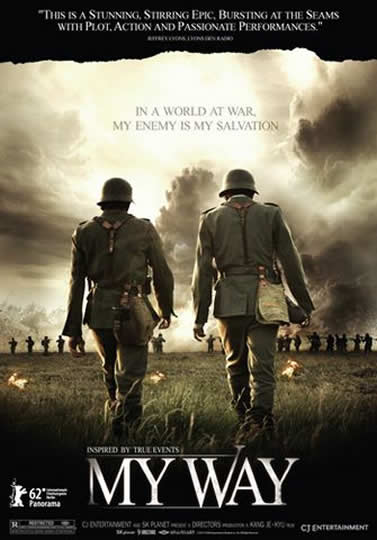 My Way, an epic telling of a WWII story that no one has ever heard before, is the latest film from Korea’s game-changing Director Jegyu Kang After emerging as bitter rivals and enemies as young marathon runners, Korean native Kim Jun-shik and Japanese aristocrat Tatsuo Hasegawa both find themselves in the Japanese army, fighting the Chinese and Soviets in a bloody battle. Jun-shik is there under duress, while Tatsuo is a powerful colonel. After both are taken prisoner by the Soviets, their mutual hatred and mistrust boils over into a violence that is only stopped by the continuing horror of the war. Forced to fight for the Soviets, the two eventually rely on each other for survival, making it to Germany, where they are in turn separated and forced to fight for the Nazis. They meet again at Normandy Beach, both unlikely survivors, bonded together by history as they struggle to survive one more terrible battle as the Allies arrive on D-Day.
My Way, an epic telling of a WWII story that no one has ever heard before, is the latest film from Korea’s game-changing Director Jegyu Kang After emerging as bitter rivals and enemies as young marathon runners, Korean native Kim Jun-shik and Japanese aristocrat Tatsuo Hasegawa both find themselves in the Japanese army, fighting the Chinese and Soviets in a bloody battle. Jun-shik is there under duress, while Tatsuo is a powerful colonel. After both are taken prisoner by the Soviets, their mutual hatred and mistrust boils over into a violence that is only stopped by the continuing horror of the war. Forced to fight for the Soviets, the two eventually rely on each other for survival, making it to Germany, where they are in turn separated and forced to fight for the Nazis. They meet again at Normandy Beach, both unlikely survivors, bonded together by history as they struggle to survive one more terrible battle as the Allies arrive on D-Day.
Bijan Tehrani: What motivated you to make My Way?
Kang Je-kyu: The true story behind My Way, namely the journey of the Korean soldier who was taken as a German POW at Normandy was so unbelievable that it would have been preposterous to propose it as a script, had it not been recorded fact. Watching the Korean broadcaster SBS’s documentary about this man, I could feel my heart beating in my chest – this single man embodied not only our country’s painful history, but also the senselessness of war, and ultimately the power of a human will to survive. I was compelled to bring this story to the screen.
Separately, I had also been ruminating for many years about the nature of the relationship between Korea and Japan, two countries that are extremely close geographically, and have built one of the world’s most robust trading and cultural exchange relationships, yet remain deeply distrustful of each other and locked in acrimonious competition. I was lucky enough to have two of my previous films, “Shiri” and “TaeGukGi: Brotherhood of War” shown in and succeed in the Japanese market. Through that experience, I was forced to change my own deep-seated and negative preconceptions about the Japanese people. I evolved from thinking about our tortured history as derivative of being “Korean” or “Japanese,” to contemplating the nature of human beings and of power itself. In the back of my mind I had been thinking for many years how a film might create more honesty and understanding in the relationship between Koreans and Japanese and move our countries toward reconciliation and greater openness. A single film may not change history, but certainly can be incredibly important in creating dialogue – that was my motivation.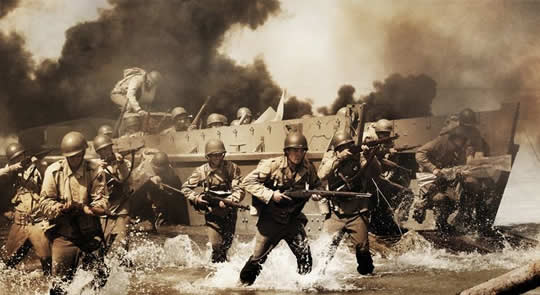
BT: Making a film at this scale and sophistication is a great undertaking, how challenging was making this film happen?
KJ: Creating a war film in itself is akin to going to war. Logistics, mobilizing the army of actors and staff is overwhelming, and honestly after “TaeGukGi” I swore never to make another war film. And yet the story had such a powerful message that I couldn’t ignore it. In my films, I’ve always placed a lot of importance on the pre-production process and planned out every shot. In this case, we planned for an 158 day shooting schedule, involving 5,500 shots (including 2,200 CGI infused shots), with 90% shot on location, and amazingly were able to complete it as scheduled and planned. I believe this in itself was a minor miracle, because after I had decided to do the film, I suddenly realized that I had no idea about how to even budget such a large undertaking.
And while massive, I hesitate to mention this film being Korea’s largest ever production, because our budget at $28MM was a fraction of what Hollywood blockbusters routinely spend. We used to joke on set that we were making a low-budget blockbuster, controlling costs through every possible means including watching our food budget and triple-checking every explosion effect so that we could get it done on the first take. The budget was a constant concern.
I had also worried about the international cast and crew –5 languages being spoken and at the first read-through we had more translators than actors! However, this turned out to be the easiest aspect of making the film. I came away from the experience incredibly energized by the shared love of film and dedication to the craft of filmmaking that united all of us.
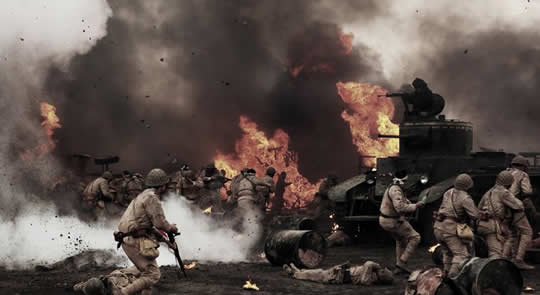 BT: How long you spent on researching the historical background of My Way?
BT: How long you spent on researching the historical background of My Way?
KJ: We had an extensive pre-production process which was undertaken in a relatively short amount of time by a small army of staff and intern researchers. We scoured video and film archives for historical footage for the Nomanhan battle between Japan and Russia, the Russian POW camps, the battle between Russia and Germany, and the Normandy battle and found there was actually very little visual information extant about those conflicts and situations, surprisingly even Normandy. We had researchers going through dissertations at Waseda University in Japan, to better understand the Nomonhan battle, which represented Japan’s most devastating battlefield loss, as well as other facts about Japanese military service. In the end, I made sure that every single prop we used, uniforms, armaments, and even the gestures and ceremonial practices of the Japanese army were based on historical fact and built the rest of the on-screen conflict through creative license. I hope that anyone approaching these incidents in the future might turn to “My Way” as a reference point since we took such extensive steps to base our work on reality.
BT: Both Jang Dong-gun and Joe Odagiri have amazing performances in your film, how did you go about casting the film?
KJ: While I didn’t write the role for either of the actors, I decided very early on that these two actors were the best embodiment of the characters of Jun-Sik and Tatsuo. These actors not only served the emotional profile of the characters, but also the physicality of the marathon runners they portray. I have worked with Jang Dong-Gun before and knew that he would go above and beyond in serving the film, and yet ultimately it wasn’t our relationship but his acting ability and match to Jun-Sik which made him a lock. Joe Odagiri is an actor well known as an independent film star in Japan and on television, so “My Way” was a big step out of his comfort zone – but it was important that he could shed light on the evolution from arrogant army colonel blinkered by blind allegiance to ideology to a simple man who appreciates human life and values.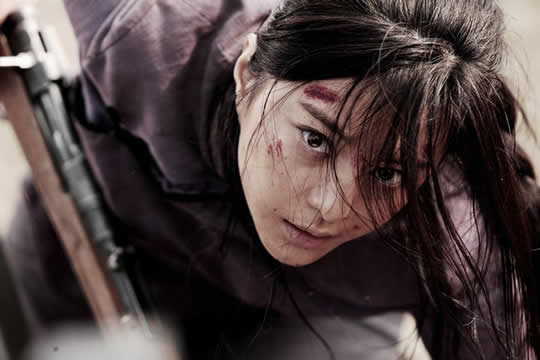
BT: How did you work with your actors? Was there long rehearsal sessions?
KJ: I had the benefit of working with fantastic actors who brought a great deal of insight into these characters. On the other hand, getting the language right was extremely important to me and we spent a lot of time making sure that Jang Dong-Gun, a Korean actor who does not speak Japanese, would look and sound like someone who grew up bilingually under a regime that stressed the primacy of Japanese culture.
BT: Did you had a solid script before starting to shoot, or you were allowing improvisations on the set?
KJ: Due to the nature of the film, the extensive battle scenes, the large set-pieces, and the extremely challenging shoot schedule, we made sure to lock in as much as we could in the pre-production stage. That said, I did try to allow for a little more spontaneity than in my previous films – to take advantage of any serendipity that might develop on set. That said, I’m not sure I was very successful in creating this freer environment, especially when everyone from crew to actors felt burdened by the great responsibility of making this historic film.
BT: In a film like My Way, the visual style of the film is very important, how did you come up with the visual style of your film?
KJ: First, an important choice in shooting a war film is to decide between long takes or short ones. The decision to do long takes allows the viewer to appreciate all the aesthetic details of the scene and fully observe what is happening – a very valid choice. I, on the other hand, chose to emphasize the complete chaos of war through quick cutting short camera takes. I wanted to capture the confusion, the absolute loss of objectivity or rationality that overtakes a person in war. This visual style was another way of layering my message about the literal senselessness of war and its human toll, as opposed to the cold objectivity with which political and military leaders attempt to package war. Secondly, having made a war film before, I didn’t want to repeat myself and also to push the envelope made possible with newer technologies made available in the last 7 years since my previous film.
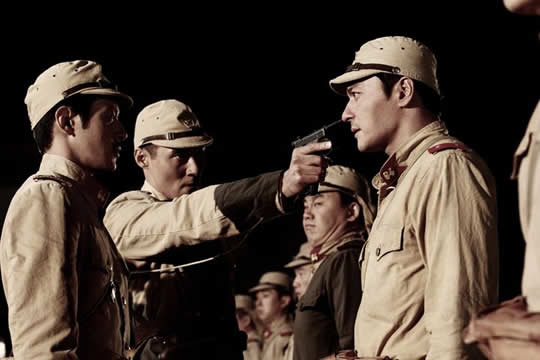 BT: Did you had any ideas about the music for My Way while in pre-production, or you decided about the music in post-production stage?
BT: Did you had any ideas about the music for My Way while in pre-production, or you decided about the music in post-production stage?
KJ: I was adamant about the importance of music for “My Way” and had an extensive original score composed for the production, which was recorded by a full symphony orchestra. The ending song of the film is also performed by Andrea Bocelli, a feat of persuasion which took over a year to happen. Despite countless previous requests, this was actually Bocelli’s first time performing a song for a film, and he did so because he believed in the message of the movie – namely the futility of war and the importance of finding common ground and understanding among people. I am extremely grateful and honored by his vote of confidence in “My Way.”
BT: What will be the effect of My Way in future of filmmaking in Korea?
KJ: I really don’t know. But I hope that the ambition of the project gives other filmmakers confidence and hope that we can imagine a larger canvas for our stories and therefore free ourselves up to be even more creative. Korean film has had a wonderful reception on the international stage and to keep growing, I believe we must keep aiming higher and higher.
BT: What is your next project?
KJ: I’m thinking that I should do a romantic comedy … just kidding (well maybe only half). I have a script that I’ve been working on myself for quite a long time, but I’m also actively looking at a lot of other scripts that are being sent to me by various producers, writers, and companies. I think the “My Way” has released me from the burden of having to constantly top myself – I’m looking forward to making a film that will embody my joy and love for telling stories. I also am adamant that I will not take another 7 years to bring a new project to fruition.

